Legal System for Business Law
VerifiedAdded on 2023/06/14
|9
|2678
|99
AI Summary
This report explains the bifurcation of laws and their applicability to the legal system of the UK. It covers the sources of law, the process of law making, and delegated legislations. It also details the statutory duties of employers towards their employees and wrongful and unfair dismissal actions.
Contribute Materials
Your contribution can guide someone’s learning journey. Share your
documents today.
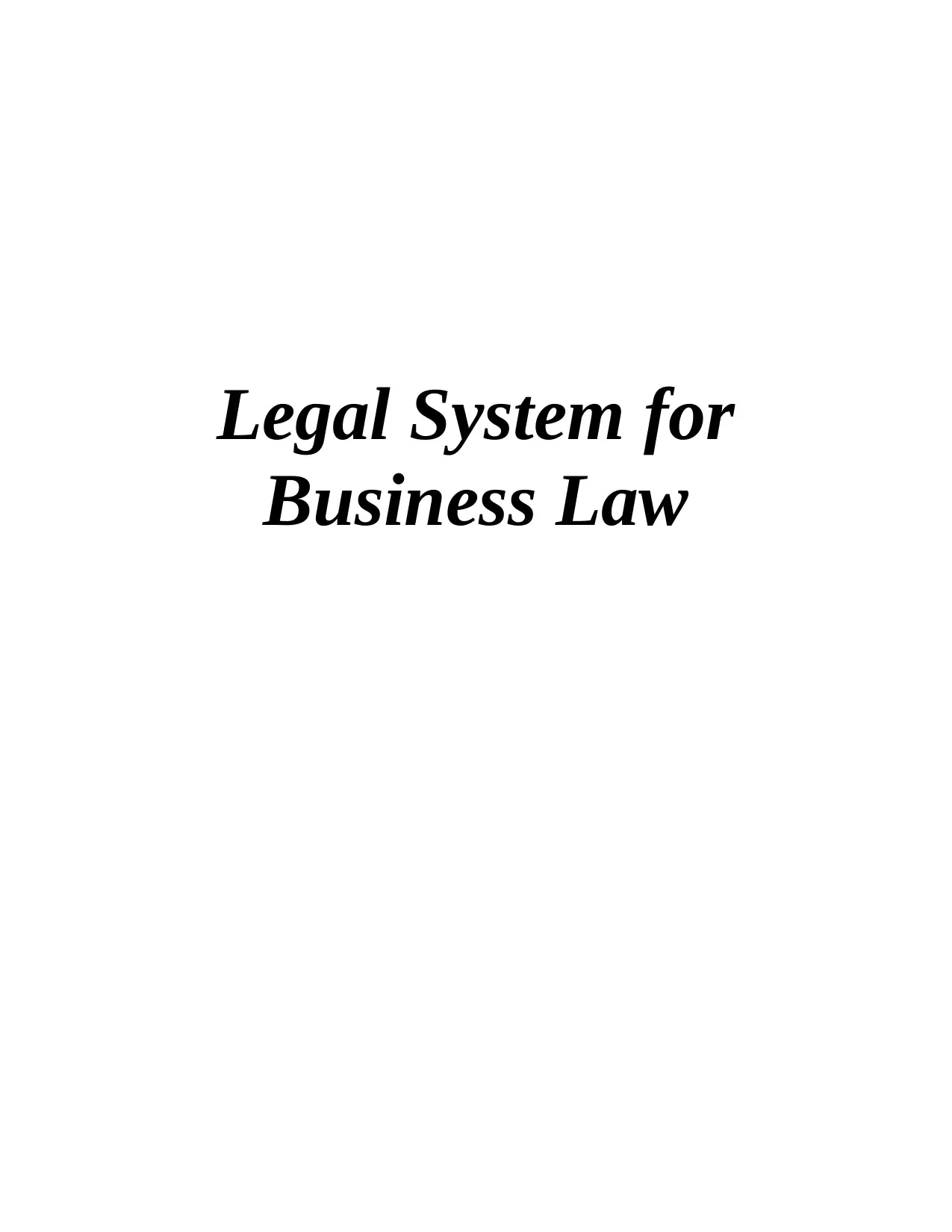
Legal System for
Business Law
Business Law
Secure Best Marks with AI Grader
Need help grading? Try our AI Grader for instant feedback on your assignments.
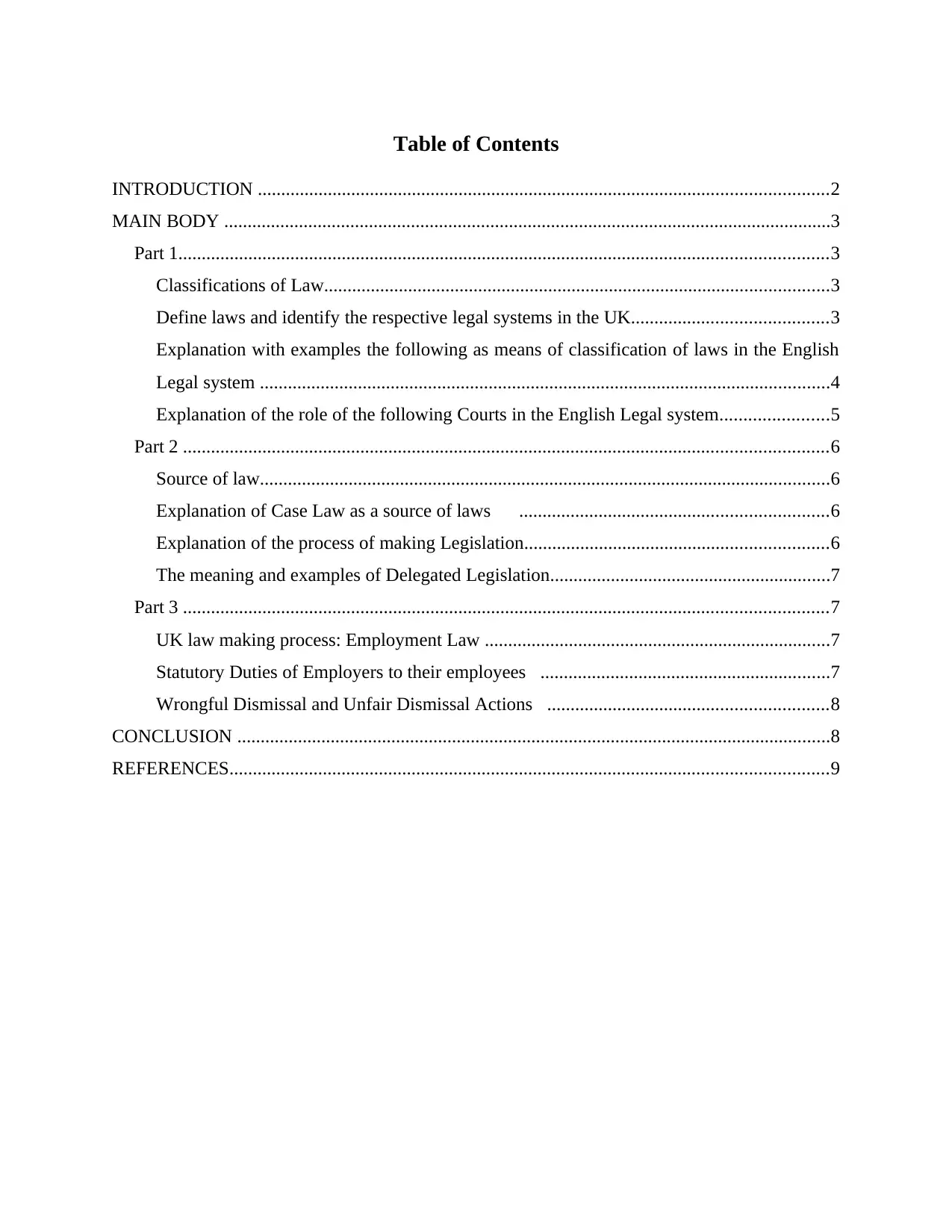
Table of Contents
INTRODUCTION ..........................................................................................................................2
MAIN BODY ..................................................................................................................................3
Part 1...........................................................................................................................................3
Classifications of Law............................................................................................................3
Define laws and identify the respective legal systems in the UK..........................................3
Explanation with examples the following as means of classification of laws in the English
Legal system ..........................................................................................................................4
Explanation of the role of the following Courts in the English Legal system.......................5
Part 2 ..........................................................................................................................................6
Source of law..........................................................................................................................6
Explanation of Case Law as a source of laws ..................................................................6
Explanation of the process of making Legislation.................................................................6
The meaning and examples of Delegated Legislation............................................................7
Part 3 ..........................................................................................................................................7
UK law making process: Employment Law ..........................................................................7
Statutory Duties of Employers to their employees ..............................................................7
Wrongful Dismissal and Unfair Dismissal Actions ............................................................8
CONCLUSION ...............................................................................................................................8
REFERENCES................................................................................................................................9
INTRODUCTION ..........................................................................................................................2
MAIN BODY ..................................................................................................................................3
Part 1...........................................................................................................................................3
Classifications of Law............................................................................................................3
Define laws and identify the respective legal systems in the UK..........................................3
Explanation with examples the following as means of classification of laws in the English
Legal system ..........................................................................................................................4
Explanation of the role of the following Courts in the English Legal system.......................5
Part 2 ..........................................................................................................................................6
Source of law..........................................................................................................................6
Explanation of Case Law as a source of laws ..................................................................6
Explanation of the process of making Legislation.................................................................6
The meaning and examples of Delegated Legislation............................................................7
Part 3 ..........................................................................................................................................7
UK law making process: Employment Law ..........................................................................7
Statutory Duties of Employers to their employees ..............................................................7
Wrongful Dismissal and Unfair Dismissal Actions ............................................................8
CONCLUSION ...............................................................................................................................8
REFERENCES................................................................................................................................9
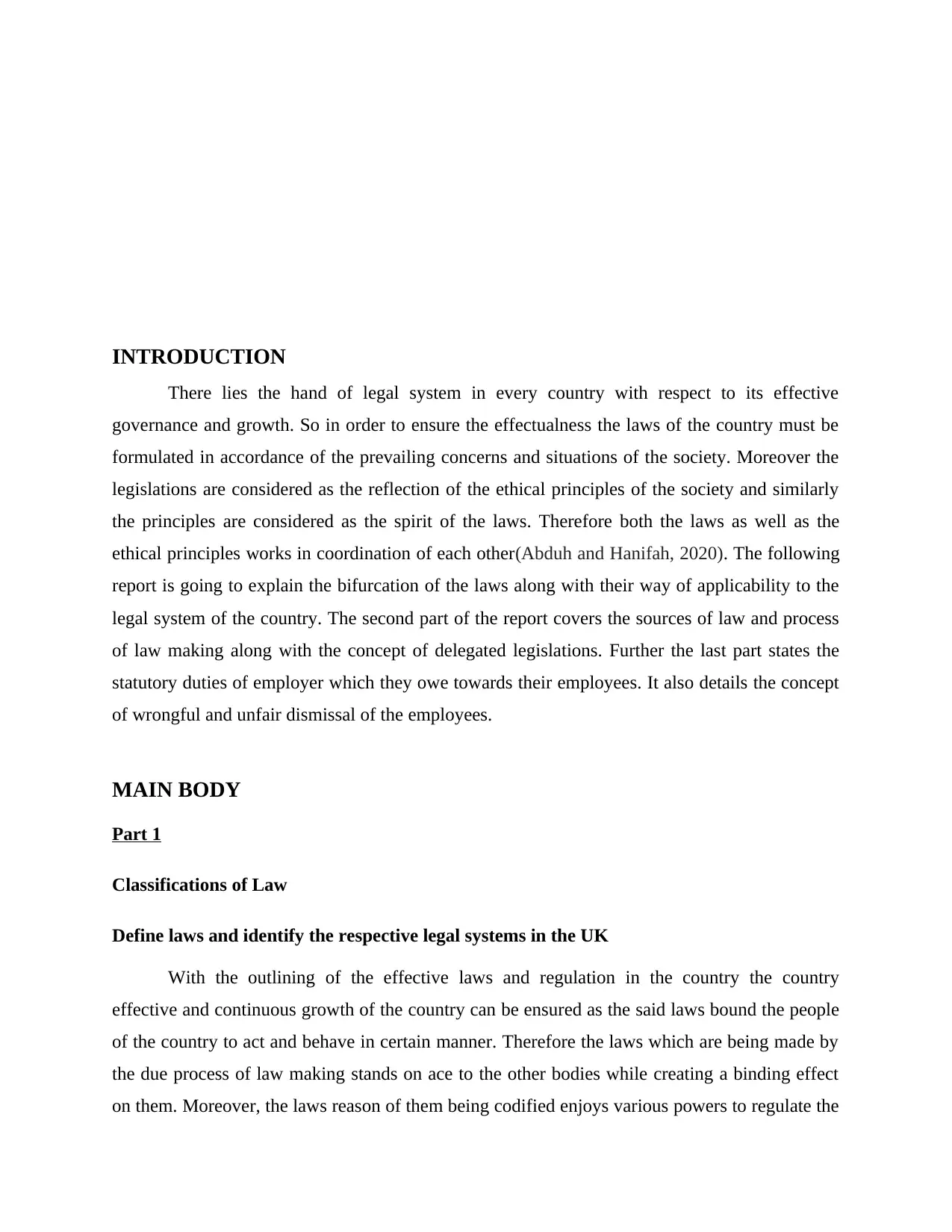
INTRODUCTION
There lies the hand of legal system in every country with respect to its effective
governance and growth. So in order to ensure the effectualness the laws of the country must be
formulated in accordance of the prevailing concerns and situations of the society. Moreover the
legislations are considered as the reflection of the ethical principles of the society and similarly
the principles are considered as the spirit of the laws. Therefore both the laws as well as the
ethical principles works in coordination of each other(Abduh and Hanifah, 2020). The following
report is going to explain the bifurcation of the laws along with their way of applicability to the
legal system of the country. The second part of the report covers the sources of law and process
of law making along with the concept of delegated legislations. Further the last part states the
statutory duties of employer which they owe towards their employees. It also details the concept
of wrongful and unfair dismissal of the employees.
MAIN BODY
Part 1
Classifications of Law
Define laws and identify the respective legal systems in the UK
With the outlining of the effective laws and regulation in the country the country
effective and continuous growth of the country can be ensured as the said laws bound the people
of the country to act and behave in certain manner. Therefore the laws which are being made by
the due process of law making stands on ace to the other bodies while creating a binding effect
on them. Moreover, the laws reason of them being codified enjoys various powers to regulate the
There lies the hand of legal system in every country with respect to its effective
governance and growth. So in order to ensure the effectualness the laws of the country must be
formulated in accordance of the prevailing concerns and situations of the society. Moreover the
legislations are considered as the reflection of the ethical principles of the society and similarly
the principles are considered as the spirit of the laws. Therefore both the laws as well as the
ethical principles works in coordination of each other(Abduh and Hanifah, 2020). The following
report is going to explain the bifurcation of the laws along with their way of applicability to the
legal system of the country. The second part of the report covers the sources of law and process
of law making along with the concept of delegated legislations. Further the last part states the
statutory duties of employer which they owe towards their employees. It also details the concept
of wrongful and unfair dismissal of the employees.
MAIN BODY
Part 1
Classifications of Law
Define laws and identify the respective legal systems in the UK
With the outlining of the effective laws and regulation in the country the country
effective and continuous growth of the country can be ensured as the said laws bound the people
of the country to act and behave in certain manner. Therefore the laws which are being made by
the due process of law making stands on ace to the other bodies while creating a binding effect
on them. Moreover, the laws reason of them being codified enjoys various powers to regulate the

manner of the individuals. But at the same times it must also be ensured by the authorities that
the the individual rights of the people does not get suppressed while formulation such laws. In
United Kingdom the laws are partially written hence they does not enjoy the sole status of
codified form(Adams and Prassl, 2018). Moreover, the laws of the country are classified in the
two major heads which are being the statutory and common laws. The statutory laws are the ones
which are being formulated by the way of due process of law making which is carried out by the
parliament of the country. Whereas the common laws are the result of the decisions which has
been inferred by the judges of the courts in the form of judicial precedents. Moreover, the
parliament comprises of the two houses as named house of lords and house of people. The
process of law making comprises of the several stages by which the proposed bill has to go
through each of them in order to acquire the royal assent to get its existence in the codified
form(Collins, Ewing and McColgan, 2019).
Explanation with examples the following as means of classification of laws in the English
Legal system
Civil law – It is the division of law which deals with the matters which are of civil
nature. It comprises of the matters which are being related to the disputes of property or goods or
are being related to the ascertainment of the individual rights of the people. The branch also
covers the cases which results due to the breach of contracts or the conflicts between the parties
relate to same. Further, under this head the party against whom some wrong has been done is
brought back in their actual position by the way of allotting the concerned remedies and
damages. Here generally the matters are resolved by the way of conflict resolution process.
Furthermore, the judges of the civil courts of the country also entertains the matters being related
to the issue of equitable consideration as a result of their part of performance which they has
already performed(Fudge, 2018). The supreme court, high courts as well as the divisional courts
are the one which specifically deals with the matters of civil nature of the country. Other than
this the tribunals as well as the appellate courts are also the one who looks after such matters.
Criminal law – It being the other major head of the law deals with the regulation of the
criminals in the society. The criminals laws governs the each such act which has been
categorised as an offence or crime under the criminal legislations of the country. The legislations
defined the person who has certain wrong or offence as the offender or the criminal. Moreover,
the the individual rights of the people does not get suppressed while formulation such laws. In
United Kingdom the laws are partially written hence they does not enjoy the sole status of
codified form(Adams and Prassl, 2018). Moreover, the laws of the country are classified in the
two major heads which are being the statutory and common laws. The statutory laws are the ones
which are being formulated by the way of due process of law making which is carried out by the
parliament of the country. Whereas the common laws are the result of the decisions which has
been inferred by the judges of the courts in the form of judicial precedents. Moreover, the
parliament comprises of the two houses as named house of lords and house of people. The
process of law making comprises of the several stages by which the proposed bill has to go
through each of them in order to acquire the royal assent to get its existence in the codified
form(Collins, Ewing and McColgan, 2019).
Explanation with examples the following as means of classification of laws in the English
Legal system
Civil law – It is the division of law which deals with the matters which are of civil
nature. It comprises of the matters which are being related to the disputes of property or goods or
are being related to the ascertainment of the individual rights of the people. The branch also
covers the cases which results due to the breach of contracts or the conflicts between the parties
relate to same. Further, under this head the party against whom some wrong has been done is
brought back in their actual position by the way of allotting the concerned remedies and
damages. Here generally the matters are resolved by the way of conflict resolution process.
Furthermore, the judges of the civil courts of the country also entertains the matters being related
to the issue of equitable consideration as a result of their part of performance which they has
already performed(Fudge, 2018). The supreme court, high courts as well as the divisional courts
are the one which specifically deals with the matters of civil nature of the country. Other than
this the tribunals as well as the appellate courts are also the one who looks after such matters.
Criminal law – It being the other major head of the law deals with the regulation of the
criminals in the society. The criminals laws governs the each such act which has been
categorised as an offence or crime under the criminal legislations of the country. The legislations
defined the person who has certain wrong or offence as the offender or the criminal. Moreover,
Secure Best Marks with AI Grader
Need help grading? Try our AI Grader for instant feedback on your assignments.
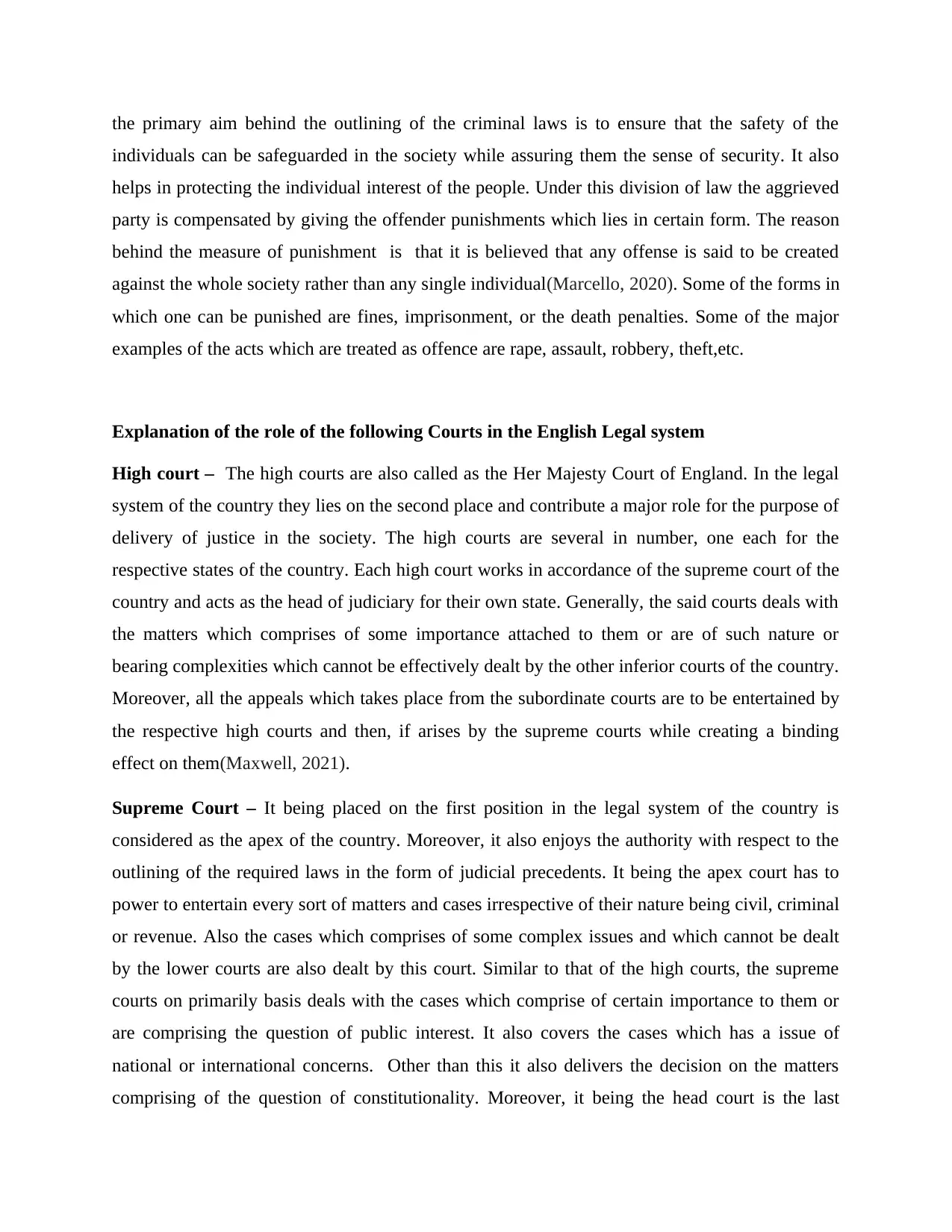
the primary aim behind the outlining of the criminal laws is to ensure that the safety of the
individuals can be safeguarded in the society while assuring them the sense of security. It also
helps in protecting the individual interest of the people. Under this division of law the aggrieved
party is compensated by giving the offender punishments which lies in certain form. The reason
behind the measure of punishment is that it is believed that any offense is said to be created
against the whole society rather than any single individual(Marcello, 2020). Some of the forms in
which one can be punished are fines, imprisonment, or the death penalties. Some of the major
examples of the acts which are treated as offence are rape, assault, robbery, theft,etc.
Explanation of the role of the following Courts in the English Legal system
High court – The high courts are also called as the Her Majesty Court of England. In the legal
system of the country they lies on the second place and contribute a major role for the purpose of
delivery of justice in the society. The high courts are several in number, one each for the
respective states of the country. Each high court works in accordance of the supreme court of the
country and acts as the head of judiciary for their own state. Generally, the said courts deals with
the matters which comprises of some importance attached to them or are of such nature or
bearing complexities which cannot be effectively dealt by the other inferior courts of the country.
Moreover, all the appeals which takes place from the subordinate courts are to be entertained by
the respective high courts and then, if arises by the supreme courts while creating a binding
effect on them(Maxwell, 2021).
Supreme Court – It being placed on the first position in the legal system of the country is
considered as the apex of the country. Moreover, it also enjoys the authority with respect to the
outlining of the required laws in the form of judicial precedents. It being the apex court has to
power to entertain every sort of matters and cases irrespective of their nature being civil, criminal
or revenue. Also the cases which comprises of some complex issues and which cannot be dealt
by the lower courts are also dealt by this court. Similar to that of the high courts, the supreme
courts on primarily basis deals with the cases which comprise of certain importance to them or
are comprising the question of public interest. It also covers the cases which has a issue of
national or international concerns. Other than this it also delivers the decision on the matters
comprising of the question of constitutionality. Moreover, it being the head court is the last
individuals can be safeguarded in the society while assuring them the sense of security. It also
helps in protecting the individual interest of the people. Under this division of law the aggrieved
party is compensated by giving the offender punishments which lies in certain form. The reason
behind the measure of punishment is that it is believed that any offense is said to be created
against the whole society rather than any single individual(Marcello, 2020). Some of the forms in
which one can be punished are fines, imprisonment, or the death penalties. Some of the major
examples of the acts which are treated as offence are rape, assault, robbery, theft,etc.
Explanation of the role of the following Courts in the English Legal system
High court – The high courts are also called as the Her Majesty Court of England. In the legal
system of the country they lies on the second place and contribute a major role for the purpose of
delivery of justice in the society. The high courts are several in number, one each for the
respective states of the country. Each high court works in accordance of the supreme court of the
country and acts as the head of judiciary for their own state. Generally, the said courts deals with
the matters which comprises of some importance attached to them or are of such nature or
bearing complexities which cannot be effectively dealt by the other inferior courts of the country.
Moreover, all the appeals which takes place from the subordinate courts are to be entertained by
the respective high courts and then, if arises by the supreme courts while creating a binding
effect on them(Maxwell, 2021).
Supreme Court – It being placed on the first position in the legal system of the country is
considered as the apex of the country. Moreover, it also enjoys the authority with respect to the
outlining of the required laws in the form of judicial precedents. It being the apex court has to
power to entertain every sort of matters and cases irrespective of their nature being civil, criminal
or revenue. Also the cases which comprises of some complex issues and which cannot be dealt
by the lower courts are also dealt by this court. Similar to that of the high courts, the supreme
courts on primarily basis deals with the cases which comprise of certain importance to them or
are comprising the question of public interest. It also covers the cases which has a issue of
national or international concerns. Other than this it also delivers the decision on the matters
comprising of the question of constitutionality. Moreover, it being the head court is the last
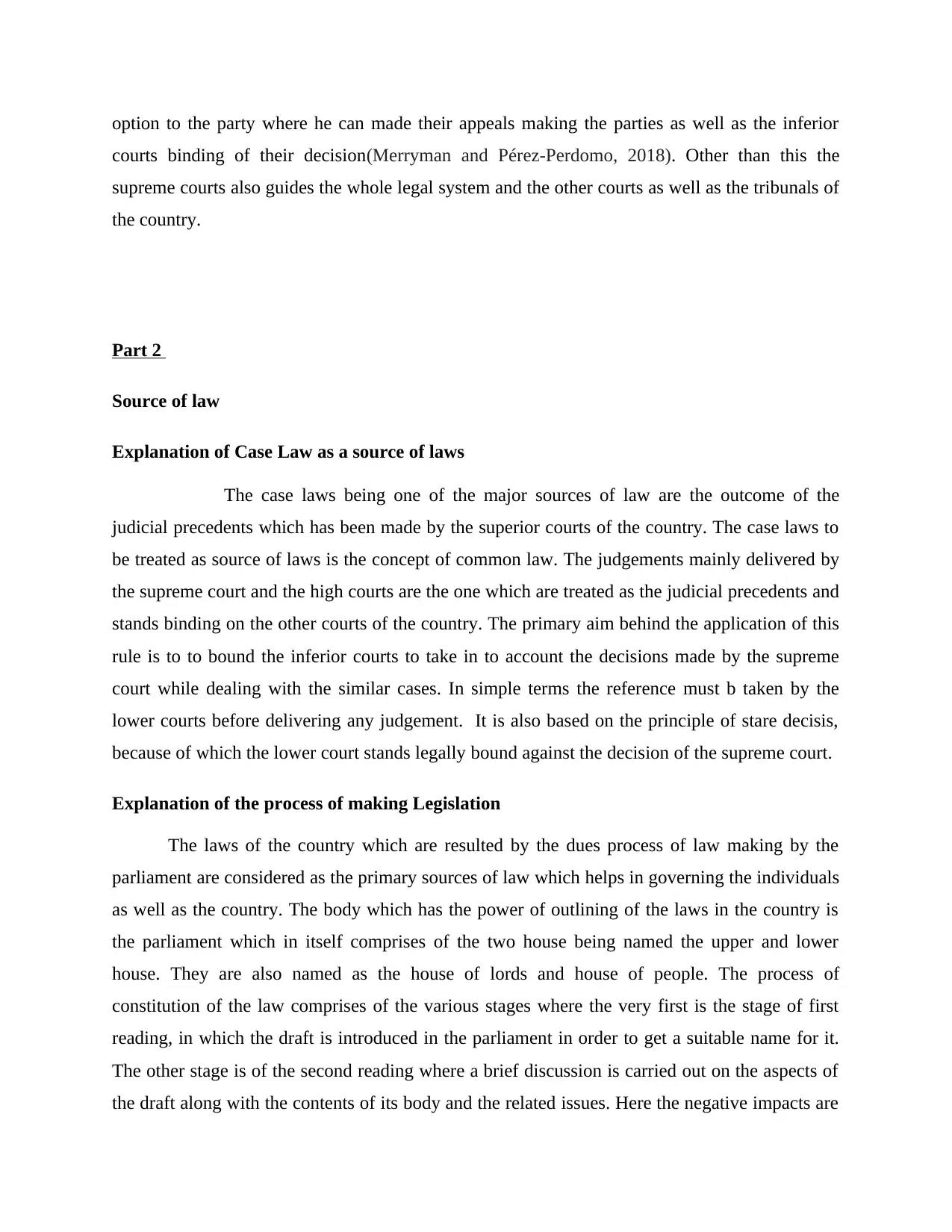
option to the party where he can made their appeals making the parties as well as the inferior
courts binding of their decision(Merryman and Pérez-Perdomo, 2018). Other than this the
supreme courts also guides the whole legal system and the other courts as well as the tribunals of
the country.
Part 2
Source of law
Explanation of Case Law as a source of laws
The case laws being one of the major sources of law are the outcome of the
judicial precedents which has been made by the superior courts of the country. The case laws to
be treated as source of laws is the concept of common law. The judgements mainly delivered by
the supreme court and the high courts are the one which are treated as the judicial precedents and
stands binding on the other courts of the country. The primary aim behind the application of this
rule is to to bound the inferior courts to take in to account the decisions made by the supreme
court while dealing with the similar cases. In simple terms the reference must b taken by the
lower courts before delivering any judgement. It is also based on the principle of stare decisis,
because of which the lower court stands legally bound against the decision of the supreme court.
Explanation of the process of making Legislation
The laws of the country which are resulted by the dues process of law making by the
parliament are considered as the primary sources of law which helps in governing the individuals
as well as the country. The body which has the power of outlining of the laws in the country is
the parliament which in itself comprises of the two house being named the upper and lower
house. They are also named as the house of lords and house of people. The process of
constitution of the law comprises of the various stages where the very first is the stage of first
reading, in which the draft is introduced in the parliament in order to get a suitable name for it.
The other stage is of the second reading where a brief discussion is carried out on the aspects of
the draft along with the contents of its body and the related issues. Here the negative impacts are
courts binding of their decision(Merryman and Pérez-Perdomo, 2018). Other than this the
supreme courts also guides the whole legal system and the other courts as well as the tribunals of
the country.
Part 2
Source of law
Explanation of Case Law as a source of laws
The case laws being one of the major sources of law are the outcome of the
judicial precedents which has been made by the superior courts of the country. The case laws to
be treated as source of laws is the concept of common law. The judgements mainly delivered by
the supreme court and the high courts are the one which are treated as the judicial precedents and
stands binding on the other courts of the country. The primary aim behind the application of this
rule is to to bound the inferior courts to take in to account the decisions made by the supreme
court while dealing with the similar cases. In simple terms the reference must b taken by the
lower courts before delivering any judgement. It is also based on the principle of stare decisis,
because of which the lower court stands legally bound against the decision of the supreme court.
Explanation of the process of making Legislation
The laws of the country which are resulted by the dues process of law making by the
parliament are considered as the primary sources of law which helps in governing the individuals
as well as the country. The body which has the power of outlining of the laws in the country is
the parliament which in itself comprises of the two house being named the upper and lower
house. They are also named as the house of lords and house of people. The process of
constitution of the law comprises of the various stages where the very first is the stage of first
reading, in which the draft is introduced in the parliament in order to get a suitable name for it.
The other stage is of the second reading where a brief discussion is carried out on the aspects of
the draft along with the contents of its body and the related issues. Here the negative impacts are
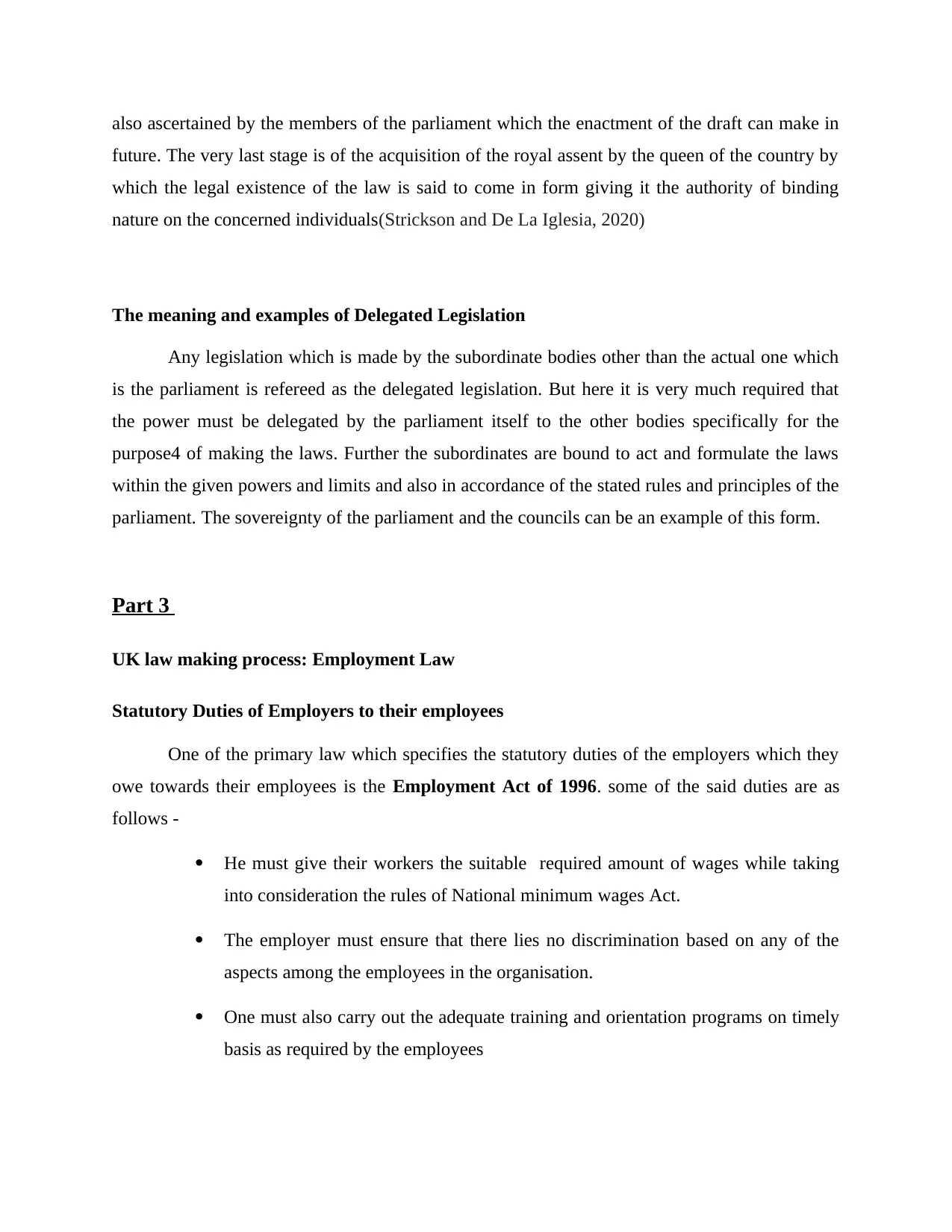
also ascertained by the members of the parliament which the enactment of the draft can make in
future. The very last stage is of the acquisition of the royal assent by the queen of the country by
which the legal existence of the law is said to come in form giving it the authority of binding
nature on the concerned individuals(Strickson and De La Iglesia, 2020)
The meaning and examples of Delegated Legislation
Any legislation which is made by the subordinate bodies other than the actual one which
is the parliament is refereed as the delegated legislation. But here it is very much required that
the power must be delegated by the parliament itself to the other bodies specifically for the
purpose4 of making the laws. Further the subordinates are bound to act and formulate the laws
within the given powers and limits and also in accordance of the stated rules and principles of the
parliament. The sovereignty of the parliament and the councils can be an example of this form.
Part 3
UK law making process: Employment Law
Statutory Duties of Employers to their employees
One of the primary law which specifies the statutory duties of the employers which they
owe towards their employees is the Employment Act of 1996. some of the said duties are as
follows -
He must give their workers the suitable required amount of wages while taking
into consideration the rules of National minimum wages Act.
The employer must ensure that there lies no discrimination based on any of the
aspects among the employees in the organisation.
One must also carry out the adequate training and orientation programs on timely
basis as required by the employees
future. The very last stage is of the acquisition of the royal assent by the queen of the country by
which the legal existence of the law is said to come in form giving it the authority of binding
nature on the concerned individuals(Strickson and De La Iglesia, 2020)
The meaning and examples of Delegated Legislation
Any legislation which is made by the subordinate bodies other than the actual one which
is the parliament is refereed as the delegated legislation. But here it is very much required that
the power must be delegated by the parliament itself to the other bodies specifically for the
purpose4 of making the laws. Further the subordinates are bound to act and formulate the laws
within the given powers and limits and also in accordance of the stated rules and principles of the
parliament. The sovereignty of the parliament and the councils can be an example of this form.
Part 3
UK law making process: Employment Law
Statutory Duties of Employers to their employees
One of the primary law which specifies the statutory duties of the employers which they
owe towards their employees is the Employment Act of 1996. some of the said duties are as
follows -
He must give their workers the suitable required amount of wages while taking
into consideration the rules of National minimum wages Act.
The employer must ensure that there lies no discrimination based on any of the
aspects among the employees in the organisation.
One must also carry out the adequate training and orientation programs on timely
basis as required by the employees
Paraphrase This Document
Need a fresh take? Get an instant paraphrase of this document with our AI Paraphraser
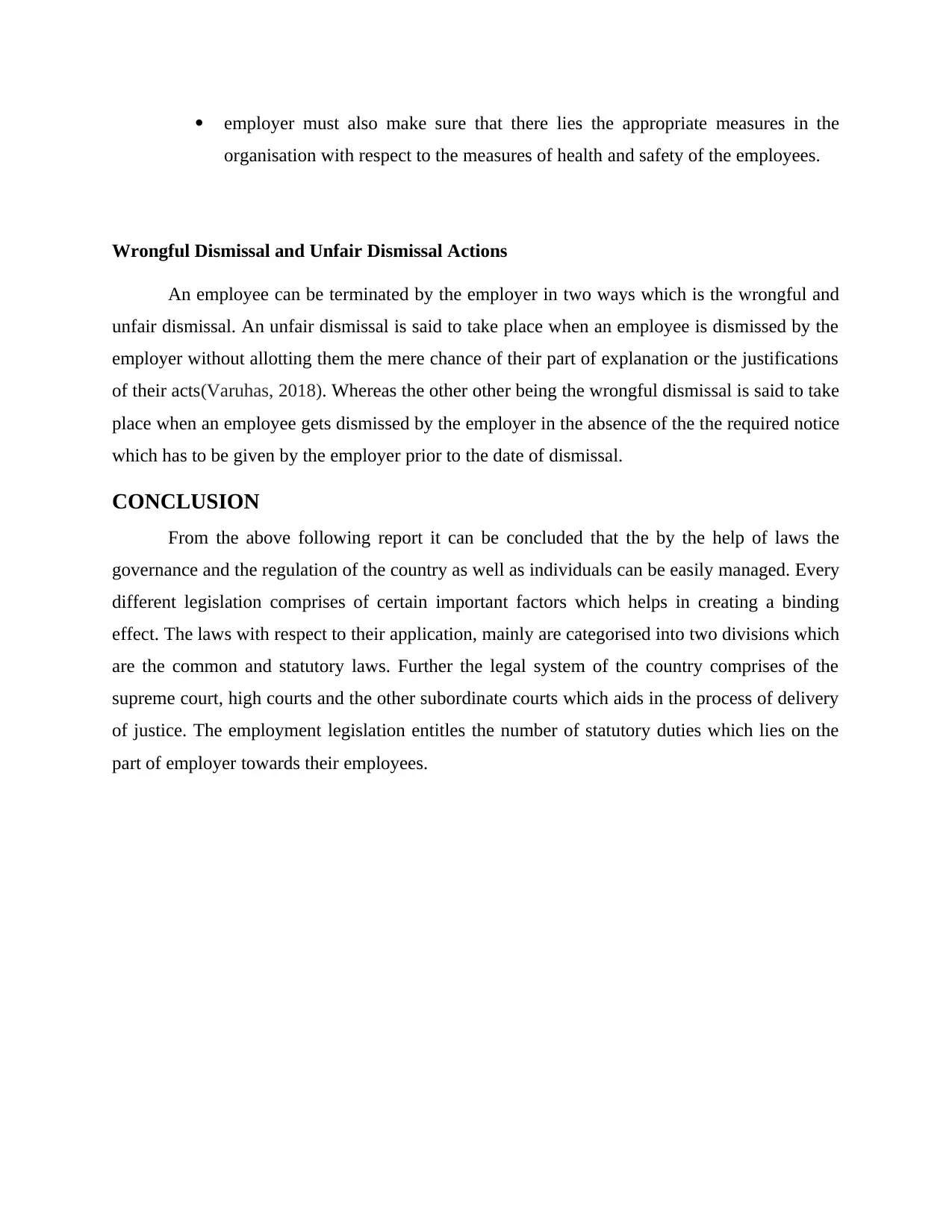
employer must also make sure that there lies the appropriate measures in the
organisation with respect to the measures of health and safety of the employees.
Wrongful Dismissal and Unfair Dismissal Actions
An employee can be terminated by the employer in two ways which is the wrongful and
unfair dismissal. An unfair dismissal is said to take place when an employee is dismissed by the
employer without allotting them the mere chance of their part of explanation or the justifications
of their acts(Varuhas, 2018). Whereas the other other being the wrongful dismissal is said to take
place when an employee gets dismissed by the employer in the absence of the the required notice
which has to be given by the employer prior to the date of dismissal.
CONCLUSION
From the above following report it can be concluded that the by the help of laws the
governance and the regulation of the country as well as individuals can be easily managed. Every
different legislation comprises of certain important factors which helps in creating a binding
effect. The laws with respect to their application, mainly are categorised into two divisions which
are the common and statutory laws. Further the legal system of the country comprises of the
supreme court, high courts and the other subordinate courts which aids in the process of delivery
of justice. The employment legislation entitles the number of statutory duties which lies on the
part of employer towards their employees.
organisation with respect to the measures of health and safety of the employees.
Wrongful Dismissal and Unfair Dismissal Actions
An employee can be terminated by the employer in two ways which is the wrongful and
unfair dismissal. An unfair dismissal is said to take place when an employee is dismissed by the
employer without allotting them the mere chance of their part of explanation or the justifications
of their acts(Varuhas, 2018). Whereas the other other being the wrongful dismissal is said to take
place when an employee gets dismissed by the employer in the absence of the the required notice
which has to be given by the employer prior to the date of dismissal.
CONCLUSION
From the above following report it can be concluded that the by the help of laws the
governance and the regulation of the country as well as individuals can be easily managed. Every
different legislation comprises of certain important factors which helps in creating a binding
effect. The laws with respect to their application, mainly are categorised into two divisions which
are the common and statutory laws. Further the legal system of the country comprises of the
supreme court, high courts and the other subordinate courts which aids in the process of delivery
of justice. The employment legislation entitles the number of statutory duties which lies on the
part of employer towards their employees.
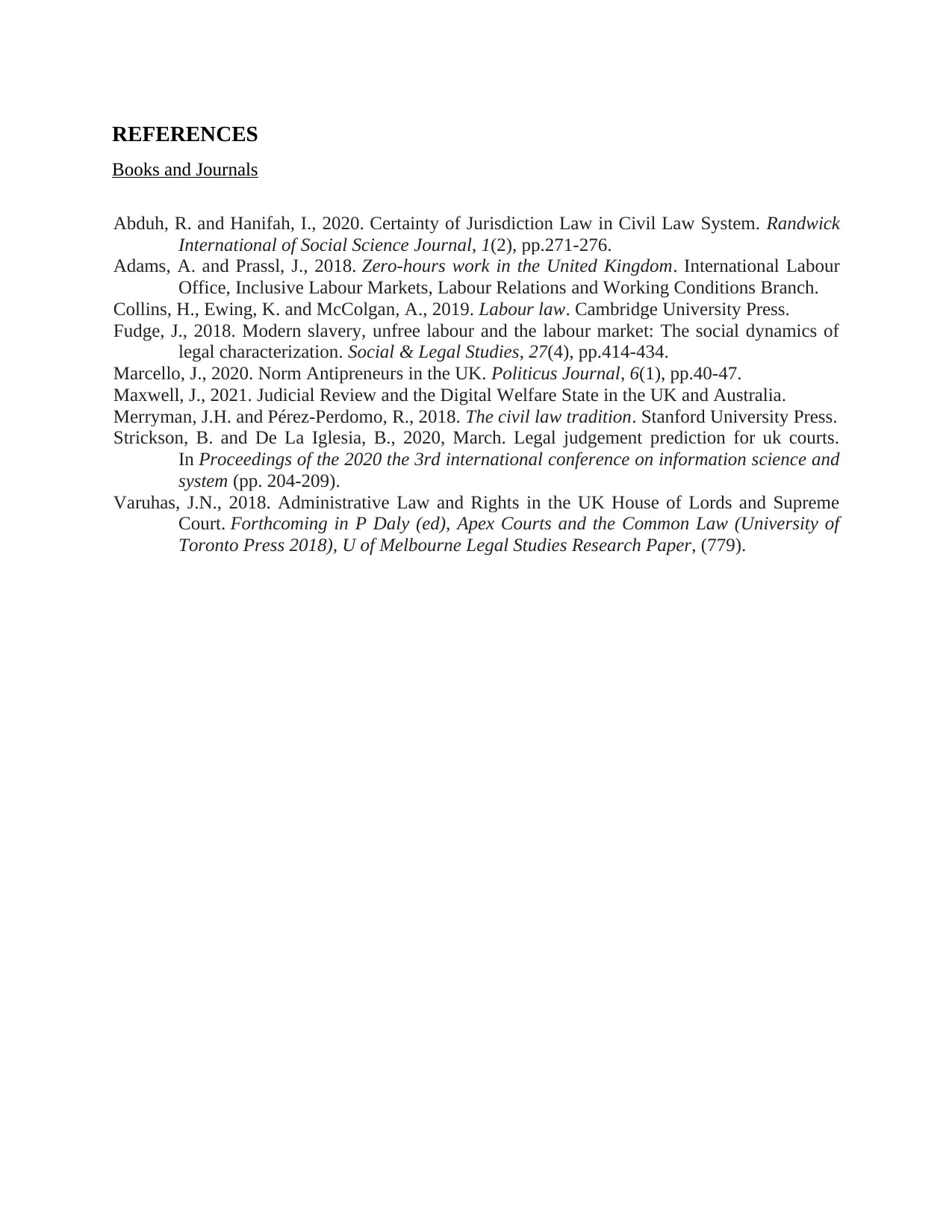
REFERENCES
Books and Journals
Abduh, R. and Hanifah, I., 2020. Certainty of Jurisdiction Law in Civil Law System. Randwick
International of Social Science Journal, 1(2), pp.271-276.
Adams, A. and Prassl, J., 2018. Zero-hours work in the United Kingdom. International Labour
Office, Inclusive Labour Markets, Labour Relations and Working Conditions Branch.
Collins, H., Ewing, K. and McColgan, A., 2019. Labour law. Cambridge University Press.
Fudge, J., 2018. Modern slavery, unfree labour and the labour market: The social dynamics of
legal characterization. Social & Legal Studies, 27(4), pp.414-434.
Marcello, J., 2020. Norm Antipreneurs in the UK. Politicus Journal, 6(1), pp.40-47.
Maxwell, J., 2021. Judicial Review and the Digital Welfare State in the UK and Australia.
Merryman, J.H. and Pérez-Perdomo, R., 2018. The civil law tradition. Stanford University Press.
Strickson, B. and De La Iglesia, B., 2020, March. Legal judgement prediction for uk courts.
In Proceedings of the 2020 the 3rd international conference on information science and
system (pp. 204-209).
Varuhas, J.N., 2018. Administrative Law and Rights in the UK House of Lords and Supreme
Court. Forthcoming in P Daly (ed), Apex Courts and the Common Law (University of
Toronto Press 2018), U of Melbourne Legal Studies Research Paper, (779).
Books and Journals
Abduh, R. and Hanifah, I., 2020. Certainty of Jurisdiction Law in Civil Law System. Randwick
International of Social Science Journal, 1(2), pp.271-276.
Adams, A. and Prassl, J., 2018. Zero-hours work in the United Kingdom. International Labour
Office, Inclusive Labour Markets, Labour Relations and Working Conditions Branch.
Collins, H., Ewing, K. and McColgan, A., 2019. Labour law. Cambridge University Press.
Fudge, J., 2018. Modern slavery, unfree labour and the labour market: The social dynamics of
legal characterization. Social & Legal Studies, 27(4), pp.414-434.
Marcello, J., 2020. Norm Antipreneurs in the UK. Politicus Journal, 6(1), pp.40-47.
Maxwell, J., 2021. Judicial Review and the Digital Welfare State in the UK and Australia.
Merryman, J.H. and Pérez-Perdomo, R., 2018. The civil law tradition. Stanford University Press.
Strickson, B. and De La Iglesia, B., 2020, March. Legal judgement prediction for uk courts.
In Proceedings of the 2020 the 3rd international conference on information science and
system (pp. 204-209).
Varuhas, J.N., 2018. Administrative Law and Rights in the UK House of Lords and Supreme
Court. Forthcoming in P Daly (ed), Apex Courts and the Common Law (University of
Toronto Press 2018), U of Melbourne Legal Studies Research Paper, (779).
1 out of 9
Related Documents
Your All-in-One AI-Powered Toolkit for Academic Success.
+13062052269
info@desklib.com
Available 24*7 on WhatsApp / Email
![[object Object]](/_next/static/media/star-bottom.7253800d.svg)
Unlock your academic potential
© 2024 | Zucol Services PVT LTD | All rights reserved.

